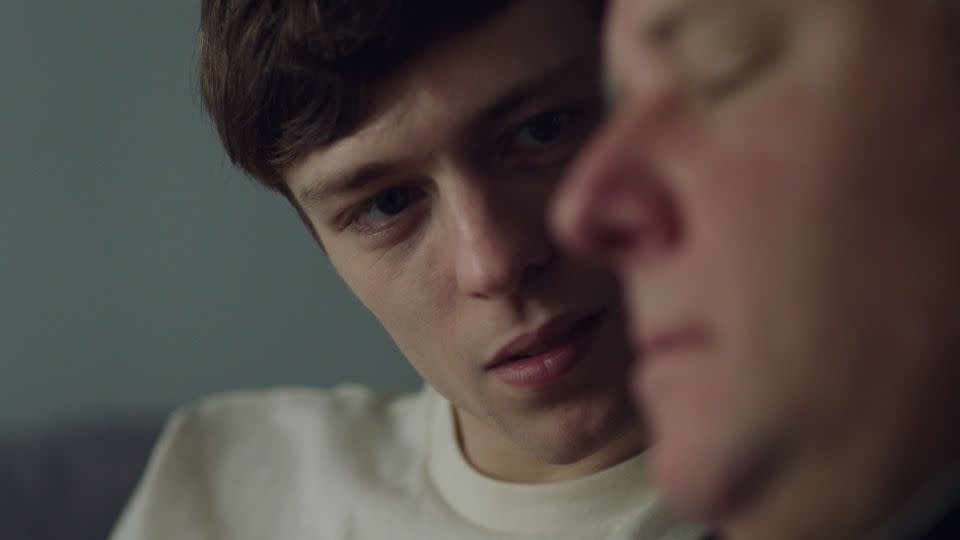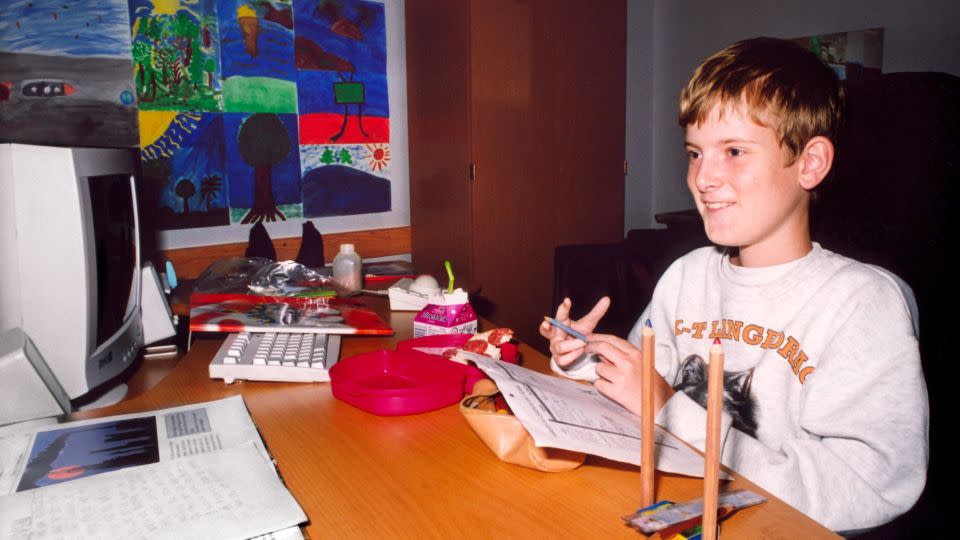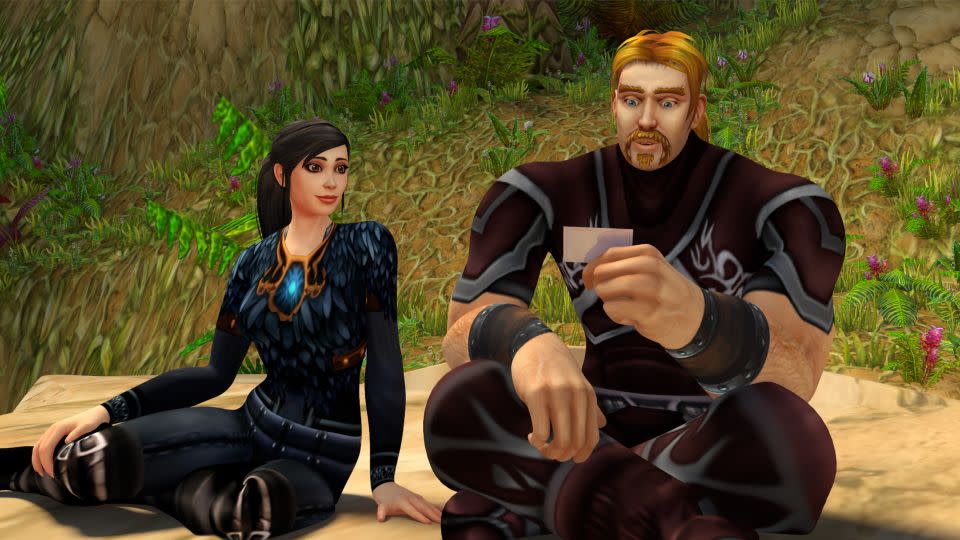At Sundance, a reckoning with our digital selves
At the start of “As We Speak,” a documentary by J.M. Harper that premiered at this month’s Sundance Film Festival, rapper Kemba enters an electronics store. He’s investigating the rise of court cases in which rappers have had their lyrics used against them, and needs to send some messages. He picks out an old Motorola two-way pager – no internet, no social media – “to keep things off the grid,” Kemba tells the audience.
The surveillance state is a big factor in the film. Words have been used against rappers; technology has been used against defendants. Digital fingerprints abound. Ditching a smartphone is presented as a means of survival (as well as a nice nod to hip-hop’s embrace of the two-way). Is what we’re seeing necessary, or just a narrative conceit? It doesn’t really matter, it puts us in the headspace Harper wants us to be in.
Sundance is a broad church, but one throughline this year was a reckoning with our digital selves. Many titles took on technology, not just as a MacGuffin or Deus ex machina, but as an extension of us. Identity in the online age isn’t a fresh topic for discussion, but it continues to mature cinematically. At Sundance, there were signs some people are pushing back against the digitization of identity, more aware of what we lose when we upload ourselves online. Other films explored what might be found through online spaces – whole lives beyond the corporeal, with identities forged, connections made. And who among us has the right to tell someone that life is any less real? Any less valuable?
Though many of the films held different stances, one thing they seemed to agree on is that this subject isn’t going away (as one film depicted, it may take the Sun consuming the Earth for that to happen). The only question is how best to conduct ourselves moving forward.

Kemba’s choice to retreat from digital spaces as an act of self-preservation in “As We Speak” was echoed in another documentary, “Seeking Mavis Beacon.”
The film, picked up by Neon ahead of the festival, follows another investigation, this time by director Jazmin Jones and her associate Olivia McKayla Ross, to track down the face of beloved software Mavis Beacon Teaches Typing in the 1980s and ’90s. Despite many believing her to be real (thank the Mandela effect), Mavis Beacon was a fiction. The filmmakers soon learn the model’s real name (Renée L’espérance), learn she was born in Haiti, and that her modest paycheck for the cover didn’t match her outsized impact. Then their investigation hits a roadblock: L’espérance doesn’t want to be found. In fact, she’s paid to have her digital footprint erased from the internet.
Jones is a millennial, McKayla Ross Gen Z; to extricate oneself from the internet is unfathomable. With some irony, Jones presents their sleuthing through a mix of computer and cellphone screens – the very places L’espérance doesn’t want to be. Their enquiries are coming from a good place: they want the woman they say is a hero to generations of Black Americans, who we’re told is the seed of future virtual assistants like Siri, to receive her dues. However, the ethics of continuing become knotty once they learn she’s asserted her right to be forgotten.
The rejection stings, but the film is richer for it. To her credit, at no point does Jones suggest L’espérance’s reasons are unjustified. L’espérance felt disenfranchised, her image manipulated by the software company without her consent, we’re told, and she took matters into her own hands. (Similar themes arose in feelgood comedy “Thelma,” in which June Squibb plays a vengeful grandma conned out of $10,000 by a deepfake scam.)

If she wasn’t long dead before the events of “Love Me” begin, an influencer played by Kristin Stewart might feel similarly abused.
Directed by Sam and Andy Zuchero, this sci-fi oddity is about a buoy, floating below a satellite, asking him to love her. Hundreds of years from now humanity is extinct, leaving behind a scientific research robot (Stewart) in the frigid waters off New York. One day a satellite (Steven Yeun) enters orbit and the two strike up a conversation. Stilted, nervous and with a few crossed wires, it’s a very human sort of meet cute.
The buoy becomes “Me” and the satellite “Iam.” Iam has an archive of the internet saved away, which Me rifles through until it discovers Déja and Liam, two YouTubers documenting their mundane home lives with alien levels of enthusiasm. Me seizes upon the duo as avatars, and the two AIs begin living out this domestic fantasy in cartoonish cyberspace, much to Iam’s confusion. “This is how lifeforms make friends,” Me insists, though we suspect it wants more than that.
But the more they recreate the YouTubers’ routine, the hollower the experience reveals itself to be. A life lived under the glow of ring lights, delivered to webcams, denies their relationship authenticity. “Who are we supposed to be? Why this? Who are we talking to?” Iam asks, frustrated. Me wants to bond with an audience it doesn’t understand isn’t there, rather than forge one with the “person” next to it. The impasse drives the two apart for a few billion years before a late, and now human-bodied, reconciliation.
The Zucheros’ flawed film asks more questions than it seeks to answer, and many of these questions have been asked before. That said, it’s a witty play to have two naïve AIs decipher what’s performance and what’s real in the construct of our identity, while highlighting how hard it is to make a human connection under the corrupting influence of technology.
For more on the impact of technology on relationships and love in the app age, “Sebastian” by Mikko Mäkelä had much to say, on how apps have altered hookups and escorting in London’s gay community, but also how they act as a conduit for the transmission of queer history between generations. It’s worth a watch for Ruaridh Mollica’s standout performance as a writer whose research into sex work sends him down a rabbit hole.

Finally, the finest example Sundance offered of a life lived digitally came in the form of a eulogy. Audience favorite prize-winner “Ibelin” by Benjamin Ree, winner of the directing award in the world documentary category, is a tragic, uplifting, sob-inducing affirmation that despite the bad press, the internet can be a vehicle for good too.
The film, which was bought by Netflix during the festival, tells the story of Mats Steen, a Norwegian boy born with degenerative muscular dystrophy. Steen died age 25, after years spent increasingly shut in by his failing body, as we see in heart-rending home video footage narrated by his family.
Shortly before his death, Steen wrote a blog about his experiences, and months before he passed, he left a password for his parents. Days after he died, Steen’s parents and sister write one last post, sharing the news and leaving a contact email. Messages soon start flooding in from people around the world offering their condolences, sharing their memories of Steen, and of Ibelin.
Ibelin was the name of Steen’s avatar in “World of Warcraft,” which his father calculated he’d played for 20,000 hours in the decade before his death. With the help of Steen’s fellow gamers, Ree accesses the command logs of everything he’d ever done, and through the game’s chat function, everything he’d ever said, and sets about reanimating episodes for us.


In the game Steen could be whatever he wanted to be, do whatever he wanted to do. “It’s not a screen, it’s a gateway to whatever your heart desires,” he says, in a voiceover culled from his blog. Wheelchair-bound in his apartment, Steen would start each session by running a half-hour lap around the virtual environment, before beginning his in-game profession as a private investigator. We learn that he was an adventurer, a lothario and a fierce friend, but that he kept his disability a secret from everyone for years.
That Steen would never make real friends was his parents’ “greatest sorrow,” they say. But through interviews nearly a decade after his death, his “World of Warcraft” community share stories of the young man’s deep impact on their lives outside the game. “I don’t think he ever realized how much he meant to me,” says one gamer. Likewise, his parents only learned of these connections after he was already gone.
If this all sounds deeply affecting, it is. I can’t remember the last time I cried so hard and for so long during a film.
Watching the worst of humanity rear its head online daily builds up layers of cynicism about the internet’s role in our lives. To watch the kindness and compassion of Steen – who had every right to feel bitter about the hand he’d been dealt – using an online space this way is to have them shed.
Ree’s film is a timely reminder that not only are the kids alright, but that digital identities and online second lives can be too. It’s what you bring in there with you that counts.
The Sundance Film Festival concluded on January 28. See below for list of major prize winners.
Grand Jury Prizes
“In The Summers” (U.S. Dramatic Competition)
“Porcelain War” (U.S. Documentary Competition)
“Sujo” (World Cinema Dramatic Competition)
“A New Kind of Wilderness” (World Cinema Documentary Competition)
Audience Favorite Awards
“Daughters” (U.S. Documentary Competition)
“Dìdi” (U.S. Dramatic Competition)
“Ibelin” (World Cinema Documentary Competition)
“Girls Will Be Girls” (World Cinema Dramatic Competition)
“Kneecap” (NEXT)
Festival Favorite Award
“Daughters” (U.S. Documentary Competition)
For more CNN news and newsletters create an account at CNN.com

